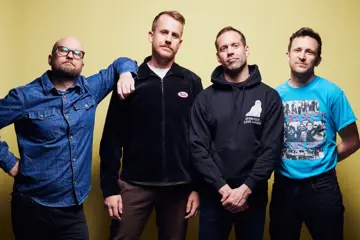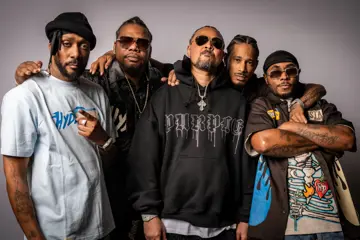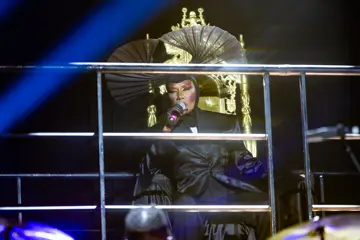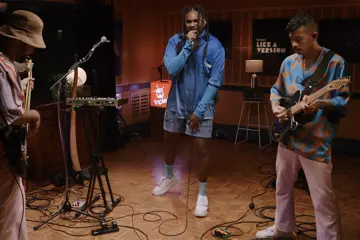Please note that this story may cause distress. If this story brings up issues for you, please reach out for support at one of the services detailed at the end of the article.
Shocking findings have been revealed today as part of an independent review into sexual harm, sexual harassment and systemic discrimination in the Australian music industry.
The Raising Their Voices report, which stems from a review by MAPN Consulting spearheaded by music industry collective Temporary Working Group with support from APRA AMCOS, ARIA, PPCA, Australia Council and Support Act, saw more than 1,600 people within the contemporary music industry contribute and uncovers high rates of sexual harassment, sexual harm and bullying.
Of those surveyed, 55% of participants had experienced some form of workplace sexual harassment, including 72% of women surveyed and 39% of males surveyed, while 85% of participants who identify as an additional gender reported at least one experience of sexual harassment.
On sexual harassment, the report also revealed that in the past five years:
- 74% of perpetrators of sexual harassment were men and 25% were women
- 45% of incidents occurred at a music venue; 21% occurred in an office; 17% at a work-related event
- 82% of survey participants did not report the sexual harassment and only 3% of survey participants made a formal report, while 71% of survey participants who made a formal or informal report of sexual harassment stated that their career progression was impacted by making this report
Don't miss a beat with our FREE daily newsletter
The Review was expanded to explore bullying further after being raised frequently by participants, with 76% of survey participants reporting bullying at work at some point in their career in the contemporary music industry.
Other key findings around bullying include:
- The perpetrator of bullying was more likely to be a man (67%) than a woman (28%
- Perpetrators of bullying included senior managers (17%), colleagues or peers (14%) and business leaders (14%) from within the victim’s workplace
- The majority of bullying took place in an office (41%) or at a music venue (29%)
- Only 6% of survey participants made a formal report, while 51% of those who did not make a bullying report did not do so because they believed a report would not change anything or nothing would be done to address the issue
On the low number of formal incident reports, it was found that “parts of the music industry are not psychologically safe and formal reporting of harmful behaviours is infrequent, often rare”.
While the review found that people in the Australian contemporary music industry “have an overwhelming passion for music and a deep commitment to working in the music industry” and are “proud of their contributions to maintaining the world-class standard of the Australian contemporary music industry”, it also discovered:
- Serial perpetrators are often an open secret and are not always held to account
- Harmful behaviours can be normalised across the music industry
- Women do not thrive to the same extent as men in the music industry
- People from diverse backgrounds, including First Nations people, People of Colour, people with disability and LGBTIQ+ people, frequently experience discrimination, resulting in a denial of opportunities
- Young people and people of diverse backgrounds can be at particular risk of harm and poor employment conditions
- A perceived pay disparity exists between genders in the music industry
- Factors including a traditionally male-dominated culture, the ready availability of alcohol, and a lack of proper regulation of workplaces can create risk
- People policies and systems are not always adequately 'lived’ across organisations in the music industry
- Ad hoc reforms will not create meaningful, systemic or long-lasting change across the music industry
In a joint statement, fifty six companies from across the music industry have addressed the report.
"As leaders in the Australian contemporary music industry, we accept the distressing findings of the Review. We acknowledge the harm documented by the Review, and we are sorry.
This Review has been a vital process of listening and truth-telling. We thank all the participants for their courage in speaking out, in bravely re-living their experiences, and engaging in this critical report. We acknowledge the impact of these behaviours on the lives of victim survivors from our industry.
Everyone has the right to work in an environment free from bullying, sexual harassment, sexual assault and discrimination. As disturbing and confronting as the findings are, the Australian music industry is committed to change and to rebuilding trust. The music industry should – and will – foster safe, welcoming, respectful, creative, and fun environments.
We have been listening and have heard your calls for change. We can and will continue to do better. We all can.
As leaders and members of the music community, we all have a responsibility to model courageous leadership and do our best to bring an end to poor and destructive behaviour. We urge all in the music industry to continue working with us to implement long-term, sustainable change for the better. We all have a personal and professional responsibility to make our culture the best it can be.
We are committed to working through the recommendations of the report, doing the necessary work and being accountable, to ensure our industry workplaces are safe, inclusive, and respectful. Our work has already started, and it will not stop until we have a culture that is safe for all."
MusicNSW Managing Director Emily Collins, who is a member of the Temporary Working Group, said that the report shows that working in the music industry had come at a high personal cost for many.
“We want to acknowledge the courage of those victim survivors and everyone who shared their stories as part of this review,” Collins said.
“Bringing this information to light is a critical first step in understanding not only the extent of harm that has occurred but also setting out a clear path for the music industry to improve and strengthen its workplace culture for everyone.”
Julia Robinson, Australian Festivals Association Managing Director and Temporary Working Group member, added: “Leaders in the music industry have a collective responsibility to use their influence to drive widespread change and create a safe and inclusive workplace built on respect.”
Other members of the Temporary Working Group, which was established in May 2021, include Deena Lynch (Jaguar Jonze), Larissa Ryan (Hutch Collective), Mardi Caught (The Annex), Sarah Woolcott (BMG Rights Management, Australia) and Sophie Paterson (Sony Music Australia).
RECOMMENDATIONS
MAPN Consulting, who outlined 17 recommendations for change as part of the review, found that there is a “strong appetite for widespread and sustainable cultural change across the contemporary music industry”.
Those recommendations include a Contemporary Music Industry Cultural Reform Council being established within 3-6 months to address sexual harm, sexual harassment, bullying and systemic discrimination, oversee the implementation of the recommendations in the report and undertake independent investigations.
The Council would also be tasked with creating and promoting a Code of Conduct, and establishing an independent specialist safe space within the industry that is trauma-informed, culturally appropriate and available for people to confidentially disclose and report any harm covered by the Code of Conduct.
The Council would also be encouraged to commission an independent review to comprehensively examine the experiences of First Nations People, People of Colour, people with disability, and LGBTIQ+ people to address the underrepresentation and treatment of those groups in the contemporary music industry.
To further increase the representation of women in key roles across the industry, as well as on festival line-ups “and all tiers of billing and award nominations”, relevant and appropriate targets have been laid out, with the music industry encouraged to implement the following targets to achieve by 2030:
- 40:40:20 (40% men, 40% women and 20% all genders) in key leadership roles across organisations greater than 15 employees
- 40:40:20 (40% men, 40% women and 20% all genders) at all industry conferences, events, panels and on bills and line-ups
The report also stressed that ongoing education and awareness campaigns are key, and recommended that industry leaders deliver a joint statement of acknowledgement addressing the issues raised and commit to cultural reform.
Other recommendations include internal reporting and response mechanisms within organisations, and monitoring and evaluation by the Council, who “should establish, within two years, a follow-up external independent review to evaluate progress on the implementation of the recommendations made in this report”.
Alexandra Shehadie from MAPN Consulting who led the review said: “I commend the music industry for commissioning this independent Review as a positive step towards identifying the areas of the music industry that need to change.
“The task now is to follow through with implementing the recommendations right across the industry. Australia has a vibrant, dynamic and creative music industry.
“It is important to ensure that it is also inclusive, respectful and safe so that all who work in it are free from harm and discrimination, and can thrive.”
The complete report can be found here.
If this story has raised personal issues for you, please reach out to one of the support services listed below.
SUPPORT SERVICES
- Support Act Helpline: 1800 959 500
- 1800RESPECT: 1800 737 732
- Lifeline Hotline: 13 11 14 or text their helpline on 0477 13 11 14
- SANE: 1800 187 263
- Suicide Call Back Service: 1300 659 467
- Beyond Blue 1300 224 636















